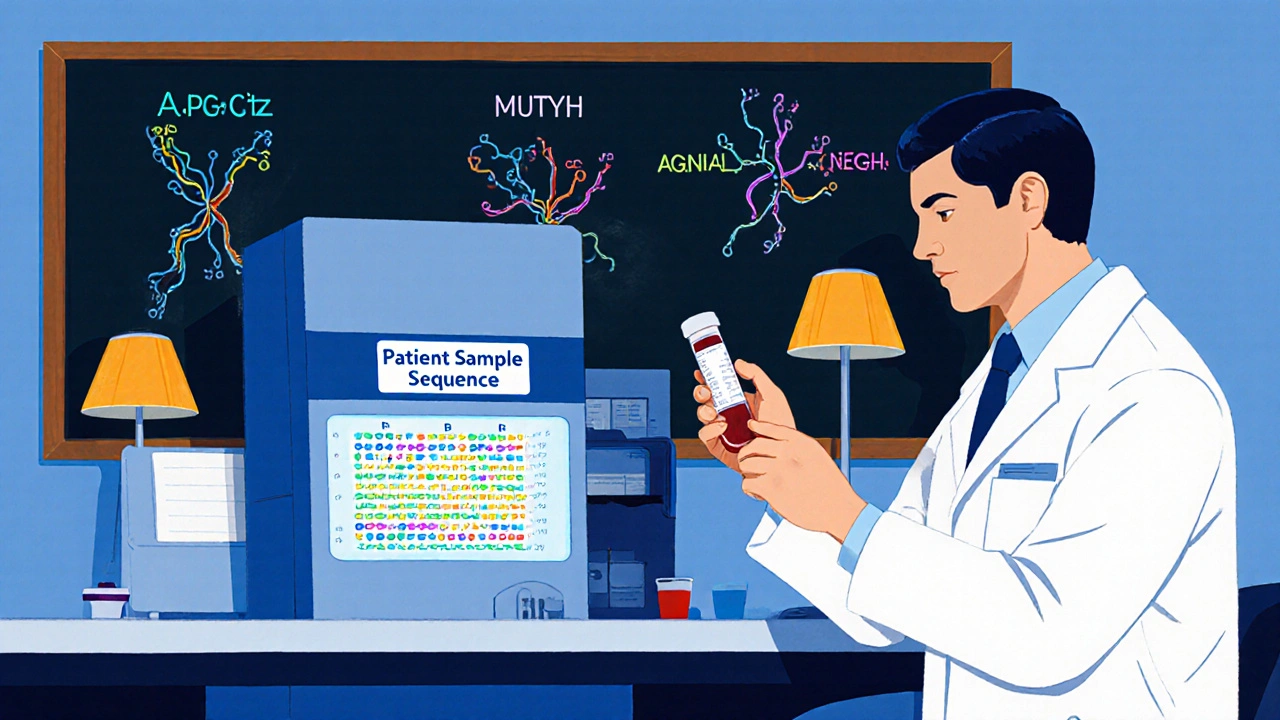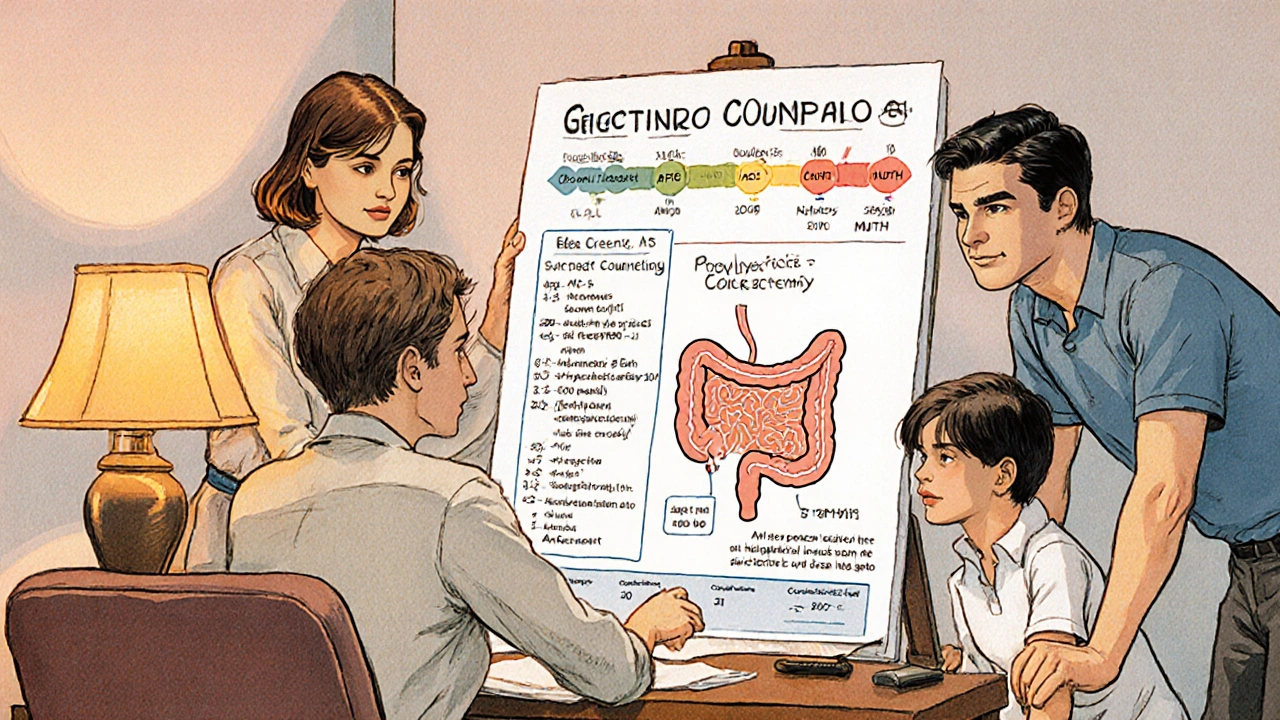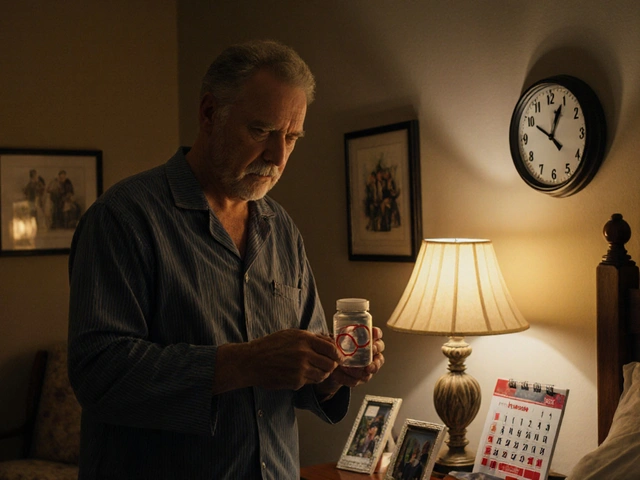Surveillance Schedule Calculator
Enter your genetic test results and clinical information to get personalized surveillance recommendations.
Recommended Surveillance Schedule
Quick Takeaways
- Polyposis is usually driven by inherited mutations in APC, MUTYH, or related genes.
- Genetic testing pinpoints the exact mutation, shaping surveillance and surgery plans.
- Choosing between single‑gene tests, multi‑gene panels, or whole‑exome sequencing depends on family history and clinical presentation.
- Positive results trigger tailored colonoscopic schedules, prophylactic colectomy options, and, in some cases, targeted drug trials.
- Genetic counseling before and after testing reduces anxiety and improves decision‑making.
Understanding Polyposis and Its Genetic Roots
Polyposis describes a condition where dozens to thousands of adenomatous polyps line the colon and sometimes the upper gastrointestinal tract. The sheer number of polyps dramatically raises colorectal cancer risk-often before age 40.
Two hereditary syndromes dominate the landscape:
- Familial Adenomatous Polyposis (FAP) - usually caused by a germline mutation in the APC gene. Patients develop >100 polyps in their teens.
- MUTYH‑associated Polyposis (MAP) - linked to biallelic mutations in the MUTYH gene. Polyps tend to appear later and in slightly lower numbers.
Other, less common genes (e.g., STK11 for Peutz‑Jeghers, BMPR1A for Juvenile Polyposis) also drive polyposis but account for a small slice of cases.
How Genetic Testing Works for Polyposis
When a clinician suspects hereditary polyposis-based on polyp count, age of onset, or family cancer patterns-they order a genetic test. The process typically follows these steps:
- Blood or saliva sample collection from the patient (and sometimes affected relatives).
- DNA extraction and quality check in a certified laboratory.
- Sequencing using Next‑Generation Sequencing (NGS) platforms, which can read thousands of gene regions simultaneously.
- Bioinformatic analysis to compare the patient’s sequences against reference genomes.
- Interpretation by clinical geneticists, who classify variants as pathogenic, likely pathogenic, benign, likely benign, or VUS (variant of uncertain significance).
Turn‑around time varies: targeted single‑gene tests may return in 2‑3 weeks, while broader panels can take 4‑6 weeks.

Key Genes Involved: APC, MUTYH, and Beyond
The most frequent culprits are:
- APC gene - located on chromosome 5q22.2, encodes a tumor‑suppressor protein that regulates β‑catenin. Over 1,200 known pathogenic variants exist, many truncating mutations.
- MUTYH gene - sits on chromosome 1p34.1, encodes a DNA‑glycosylase involved in base‑excision repair. The two most common pathogenic variants in European populations are p.Tyr179Cys and p.Gly396Asp.
- Additional genes - STK11 (Peutz‑Jeghers), BMPR1A and SMAD4 (Juvenile polyposis), and DNA mismatch‑repair genes (MLH1, MSH2, MSH6, PMS2) linked to Lynch syndrome which can also present with multiple polyps.
Knowing which gene is mutated guides the clinician’s surveillance schedule and informs relatives about their own risk.
Choosing the Right Test: Panels vs Single‑Gene vs Whole‑Exome
Three main test formats dominate UK clinical practice:
| Test Type | Scope | Typical Cost (UK) | Turn‑around |
|---|---|---|---|
| Single‑Gene (APC or MUTYH) | One gene, full coding region | £300‑£500 | 2‑3 weeks |
| Multi‑Gene Panel (10‑20 polyposis‑related genes) | All common hereditary polyposis genes | £800‑£1,200 | 4‑6 weeks |
| Whole‑Exome Sequencing (WES) | All coding genes (~20,000) | £1,500‑£2,500 | 6‑8 weeks |
When family history points clearly to APC or MUTYH, a single‑gene test saves money and simplifies interpretation. If the pattern is ambiguous-e.g., mixed family cancers or a low‑polyp burden-a panel or WES avoids repeated testing.
Interpreting Results: Positive, Negative, and VUS
A “positive” result means a pathogenic or likely‑pathogenic variant was found. This triggers cascade testing for first‑degree relatives, often via saliva kits.
A “negative” result does not guarantee safety. It could reflect: (a) a mutation in an untested gene, (b) a large genomic rearrangement missed by standard NGS, or (c) a de‑novo mutation that escaped detection. In such cases, clinicians may still recommend intensified surveillance based on phenotype.
Variants of uncertain significance (VUS) are the most frustrating. They lack enough evidence to be classified as harmful. Management usually follows the patient’s clinical picture until more data emerge-often through international databases like ClinVar.

Impact on Treatment Decisions: Surveillance, Surgery, and Targeted Therapies
Genetic information reshapes three core management pillars:
- Surveillance - APC carriers start colonoscopy at age 10‑12, repeating every 1‑2 years. MUTYH biallelic carriers begin at 25‑30 years, with 2‑3‑year intervals. Panel‑tested patients receive schedules tailored to the most penetrant gene identified.
- Prophylactic Colectomy - For classic FAP (≥100 polyps) or when polyps become high‑grade dysplasia, total proctocolectomy with ileal pouch‑anal anastomosis (IPAA) is standard. In MAP, surgery is reserved for refractory disease because polyps appear later.
- Targeted Therapies - Recent trials (2023‑2024) show COX‑2 inhibitors (e.g., celecoxib) can modestly reduce polyp burden in APC‑mutated patients. Ongoing studies explore PARP inhibitors for MUTYH‑deficient tumors.
All decisions should be made after a thorough genetic counseling session, ensuring patients understand benefits, risks, and lifestyle implications.
Practical Checklist for Patients and Clinicians
- Gather a three‑generation family cancer history before ordering any test.
- Schedule a pre‑test genetic counseling appointment.
- Decide on test type (single‑gene vs panel) based on phenotype.
- Ensure the laboratory is accredited by the UK Accreditation Service (UKAS) and participates in the UK Genetic Testing Network.
- After results, update the patient’s electronic health record with variant classification and recommended surveillance interval.
- Offer cascade testing to at‑risk relatives within 6 months of a positive result.
- Re‑evaluate management annually; consider re‑testing if a VUS later reclassifies.
Frequently Asked Questions
Can I get genetic testing if I only have a few polyps?
Yes. Even a modest polyp count can signal a hereditary form, especially if you have a family history of early‑onset colorectal cancer. A multi‑gene panel is often recommended in such borderline cases.
Is genetic testing covered by the NHS?
The NHS funds testing for individuals meeting specific clinical criteria (e.g., >100 polyps, a known family mutation, or early‑onset cancer). If you fall outside these guidelines, private testing is an option.
What does a VUS mean for my treatment?
A VUS is a genetic change whose impact is unclear. Management usually follows the clinical picture-regular colonoscopy and lifestyle advice-while waiting for research to clarify the variant.
How often should I have colonoscopy if I carry an APC mutation?
Current UK guidelines recommend annual or biennial colonoscopy starting at age 10‑12, with intervals adjusted based on polyp growth and dysplasia grade.
Can relatives avoid testing if I test negative?
A negative result reduces the likelihood of a shared pathogenic variant, but relatives might still need testing if they have a concerning personal or family history.






Comments
Rajesh Singh
18/Oct/2025Relying on genetic testing alone without proper counseling is a reckless shortcut that sidelines the human side of medicine. The science is dazzling, but the moral responsibility to explain uncertainty and familial implications is non‑negotiable. When you hand a patient a report full of acronyms like APC, MUTYH, or VUS, you owe them more than just a lab number.
Albert Fernàndez Chacón
18/Oct/2025The panel approach captures low‑frequency variants and reduces false negatives, especially when family history is ambiguous. In practice, a multi‑gene panel costs a bit more but streamlines the diagnostic pathway. Turn‑around times of 4‑6 weeks are typical, giving clinicians enough breathing room to schedule follow‑up counseling.
Drew Waggoner
18/Oct/2025When the lab hands you a VUS, the uncertainty gnaws at you like a relentless tide. It feels like standing in a hallway of mirrors, each reflection a possible destiny, yet none concrete enough to act on. The emotional weight can be heavier than any colonoscopic finding.
Mike Hamilton
18/Oct/2025i think the cultural context of screening matters, we should not ignore the fact that some families view genetic testing as a taboo. this isnt just about dna, its about trust and history. even a simple convo about colonoscopy can trigger deep‑seated fears that need gentle handling.
typos happen when we rush, but the message stays clear: empathy wins.
Matthew Miller
18/Oct/2025Time to get those colonoscopies scheduled!
Liberty Moneybomb
18/Oct/2025What they don’t tell you is that the NHS is quietly funneling genetic data into centralized databases that can be accessed by private insurers. Some claim it’s for research, but the line between public good and profit can blur in ways most patients never see. The whole system feels like a stage where the audience is always watching.
Alex Lineses
18/Oct/2025When you sit down with a family about hereditary polyposis, the first thing to establish is a shared vocabulary.
Explain that a pathogenic APC mutation carries a near‑certain risk of hundreds of polyps, whereas a biallelic MUTYH variant often presents later and with fewer lesions.
Clarify that surveillance intervals are calibrated to that genetic risk, typically annual colonoscopy for APC carriers starting in pre‑teens.
For MUTYH carriers, the schedule relaxes to every two to three years beginning in the late twenties.
Emphasize that these recommendations are not rigid rules but evidence‑based baselines that can be adjusted for polyp burden.
Make it clear that prophylactic colectomy is a preventive strategy, not a punitive one, and that quality‑of‑life outcomes have improved dramatically with modern pouch techniques.
If a VUS surfaces, reassure the patient that clinical management still follows the phenotypic picture until the variant is re‑classified.
Encourage enrollment in registries such as ClinVar, because collective data accelerate reinterpretation.
Highlight that cascade testing for first‑degree relatives is cost‑effective and ethically responsible.
Use plain language when describing inheritance patterns: autosomal dominant for APC, autosomal recessive for MUTYH.
Address potential psychosocial impacts, noting that anxiety peaks around test disclosure and can be mitigated by early counseling.
Remind them that lifestyle factors-diet, smoking, NSAID use-still play a role, even with a genetic predisposition.
Point out that emerging targeted therapies, like COX‑2 inhibitors, are adjuncts, not replacements for surveillance.
Stress that regular multidisciplinary meetings with gastroenterology, genetics, and surgery keep the care plan dynamic.
In short, the genetic result is a roadmap, not a final verdict, and the patient remains the driver of their health journey.
Stay proactive, ask for updates, and never assume that a negative panel eliminates all risk.
kendra mukhia
18/Oct/2025Anyone still debating the need for pre‑test counseling clearly hasn't read the guidelines. Skipping that step is a shortcut that endangers both the patient and their relatives. The data are unequivocal: informed consent reduces post‑test anxiety and improves adherence to surveillance.
Bethany Torkelson
18/Oct/2025Stop sugar‑coating the risks; the numbers are stark and the consequences real. A pathogenic APC mutation virtually guarantees a high polyp burden, and delaying colonoscopy can be fatal. Patients deserve blunt facts, not comforting lies.